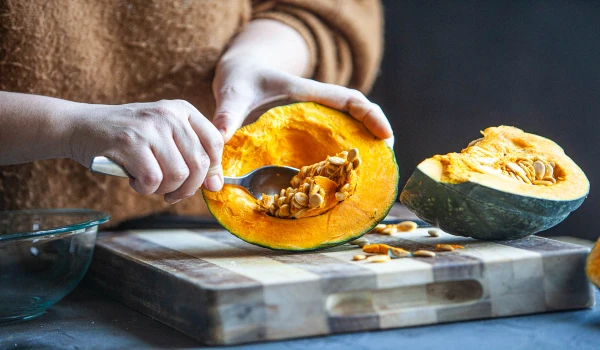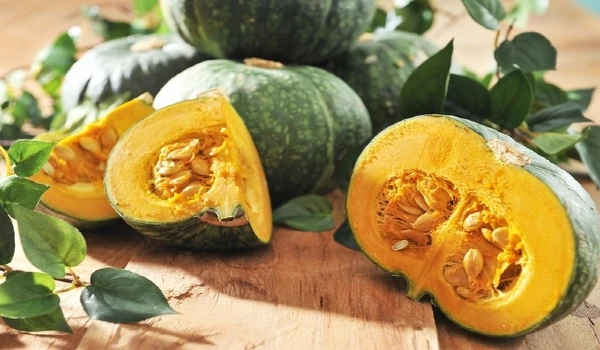Kabocha squash 6 benefits, storage method, calories, side effects
Kabocha squash Nutrition

| Kabocha squash (100g) Nutrition | |||
| Carbohydrate | Protein | Fat | Calories |
| 9.2g | 1.1g | 0.2g | 38kcal |
| Main Nutrition | beta-carotene, vitamin C | ||
| Main Benefits | Strengthening immunity, anti-cancer effect, improving vision health, diet | ||
| Side Effects | Excessive intake may cause diarrhea and abdominal pain. People with low blood pressure should be careful when consuming it. | ||
Kabocha squash is a variety of pumpkin. Winter squash is an annual vine plant. The origin is South America. Unlike the commonly known pumpkin, it is smaller in size and has a dark green outer skin. Kabocha squash requires about two weeks of post-ripening period after harvest to increase its sugar content, so it is usually eaten after going through the post-ripening process rather than immediately after harvest. Kabocha squash can be eaten in a variety of ways: steamed, mashed and eaten as a salad, or ground and eaten as a soup.
Kabocha squash benefits

1. Anticancer Effect
Kabocha squash contains carotenoids, compounds that function as fat-soluble antioxidants, which may help prevent and protect against cancer. It is also rich in vitamins C and A. These also have the function of suppressing the production of nitrosoamine, a carcinogen, and thus help prevent cancer by preventing the development, growth, and metastasis of cancer cells.
2. Protect your eyesight
Kabocha squash contains beta-carotene, which is converted to vitamin A when absorbed into the body. This converted vitamin A is essential for eye health, helping the retina absorb and process light. Pumpkin also contains lutein, which helps protect against the risk of cataracts and macular degeneration.
3. Strengthen immunity
Kabocha squash is rich in compounds that can strengthen your immune system. One of them is vitamin A, which strengthens the immune system and helps fight foreign bacteria and viruses. Kabocha squash also contains vitamin C, which increases white blood cell production and allows immune cells to work effectively, helping wounds heal faster.
4. Gut health
Adding an appropriate amount of Kabocha squash to your diet may help relieve constipation by stimulating bowel movements. In addition, it can create an environment where beneficial bacteria, including lactic acid bacteria, can actively exercise, and through this, various intestinal-related diseases can be prevented.
5. Weight management
Kabocha squash is low in calories and rich in dietary fiber. This makes you feel full quickly even if you eat just a small amount and slows down digestion, which is helpful for people who are trying to manage their weight.
6. Skin health
Providing plenty of vitamins, such as vitamins A and C, has great benefits in promoting skin health. In particular, vitamin C can brighten skin tone, relieve acne, and speed up skin wound recovery.
Storage Method
Kabocha squash storage methods can be divided into room temperature storage and refrigerated storage.
When storing at room temperature, it is recommended to wrap it in a kitchen towel or newspaper and store it in a cool place away from direct sunlight. At this time, to prevent mold from forming, you can store it for a longer period of time by keeping the top part facing down.
If refrigerating, wash and drain Kabocha squash. Afterwards, it is recommended to dig out the seeds, divide them into small pieces, and store them in an airtight container or zipper bag.
Side Effect
- Kabocha squash is rich in dietary fiber. Dietary fiber is useful for our body, but overeating it can cause indigestion and abdominal pain.
- Because it contains a lot of beta-carotene, excessive consumption can cause carotenemia, which causes the skin on the palms of the hands and around the nose to turn yellow.
- Since it is a food that helps lower blood pressure, it can be dangerous for people with low blood pressure.
References
🔹Nutrition And You: Kabocha Squash Nutrition facts
🔹Dr.Axe: Kabocha Squash Nutrition Benefits Digestion
🔹StyleCraze: Kabocha Squash: Nutrition,Health Benefits, And Recipes